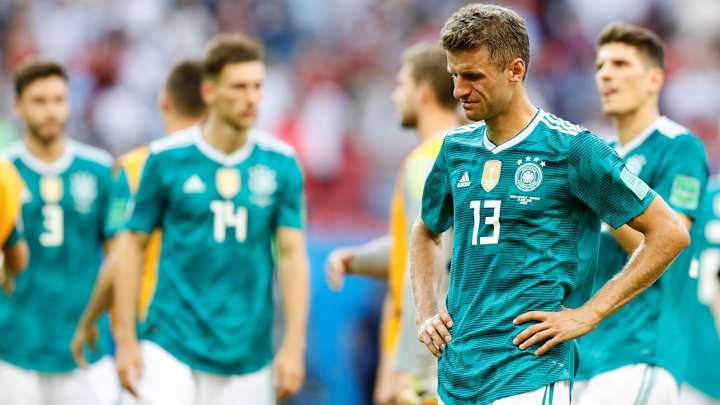Arrogant Germany Accepts Its Shocking, Deserved World Cup Elimination

KAZAN, Russia – Against Sweden, when Toni Kroos whipped in his late winner, the general feeling was that this was what Germany does. This was what it has been so good at over the years. Always, somehow, finding the vital goal at the final moment. Always somehow, finding a way through. This is the essence of being a Turniermannschaft–a tournament team–that no matter how badly actually plays, it always prevails.
But something changed in German football in 2006. Jurgen Klinsmann was placed in charge of the national side with a specific brief to change how it played, to make it more modern, more progressive, to instill the pressing game that, belatedly, Germany had adopted. He turned out not to be the coach to take Germany into the future, but his assistant, Jogi Low, was.
Low has won a World Cup and a Confederations Cup, has overseen the transformation of German football into a machine that spews out a constant stream of technically gifted attacking midfielders, and yet he has never quite shaken off the accusation that he is a coach who happened to be in the right place at the right time, a competent manager for this generation rather than some indelible genius.
For 12 years he has had extraordinary success, always reaching at least the semifinals of tournaments. But here came the test, and it turns out that when Germany is under pressure, those old virtues, the Fuhrungsspieler of old, are not there any more. This is a Germany that struggles to win if it is not playing well. And so Low considers his future, while Germany contemplates exiting the World Cup before the last eight for the first time since 1938 after a 2-0 loss to South Korea.
“It is too early for me to answer that question [of whether I will continue]," he said. "We need a couple of hours to see things clearly. The disappointment is deep inside me. I couldn't imagine that we would lose to South Korea. I’m shocked because we didn’t pull it off today. It was my impression I spoke to the team that they were under pressure and they wanted to move ahead. It’s premature for me to say something, I’m incredibly disappointed. Where we go from here … we will have to take some time and talk about it calmly.”
From Elimination to Elation: Argentina Somehow Staves Off Early World Cup Exit
Arrogance, he admitted in a strangely calm press conference, had played its part, certainly in the defeat to Mexico, when Germany had attacked with abandon, tossing fullbacks forward on both flanks and leaving only the superannuated legs of Sami Khedira to protect the back four.
“We had a good training camp,” Low said. “The team worked well, players were training really well. But the two friendly matches, against Austria and Saudi Arabia, were not good. Maybe we thought at the push of a button we could shift gears, but we lost against Mexico. If we had taken a point it would have been different. We couldn’t flip that switch. We were convinced once tournament started we would be able to play well but it didn’t happen.”
What was striking here was the lack of fight. When the news came through that Sweden was beating Mexico, Germany had to win, Low sent on Mario Gomez and Thomas Muller, who, having been out of sorts for a couple of years, had been omitted from a tournament game for the first time since the semifinal of Euro 2012. But still there was no real pressure applied. Cho Hyun-woo, South Korea’s extrovert goalkeeper, did make one excellent save from Leon Goretzka early in the second half, but that was it. It was all oddly, uncharacteristically, anemic.
“We didn’t deserve to win the World Cup again,” said Low. ‘We didn’t deserve to reach the round of 16. We never had a chance to take the lead at any point after the 70th minute when we saw Sweden had lead. We were missing our ease of play, our classiness, our dynamism was not there, so we deserved to be eliminated, yes.”
South Korea struck twice in injury time, the first lashed in by Kim Young-gwon and given as a goal after VAR proved the touch that had played the ball to him had come from Kroos and that he was therefore not offside. That felt like football having its fun, turning the hero of the last game into the fall guy, and that sense of a sport toying with its champion was compounded with the second goal. Manuel Neuer’s surge from his box, his aggressive exploitation of the notion of the sweeper-keeper, was one of Germany’s strengths four years ago. Here it undid his side as he was caught in possession deep in Korean territory and a simple long-ball released Son Heung-min to charge on and roll into an empty net.
For the fourth time in the past five World Cups, the champion has gone out in the group phase, but none of those shocks have been quite as unexpected as this. Germany’s youth development has been so effective it seemed to have removed failure as an option. Football, though, will never tolerate thoughts of such hubris.

An accomplished author of multiple books, Jonathan Wilson is one of the world’s preeminent minds on soccer tactics and history.